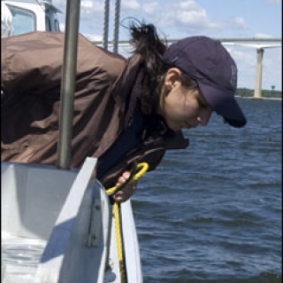Eight students will be presenting the summer work at the Ocean Sciences Meeting in March 2022!
Hazel Ruiz, Bucknell University
Class Year:
2008Mentor:
Christopher Rowe, Ph.D.Project Title:
Acidification Effects on Soft Shell Clam Biocalcification
Abstract:
The goal of this study was to determine whether increasing acidic conditions in coastal waters will affect the calcification rate of the bivalve Mya arenaria. Acidification is caused by anthropogenic emissions of carbon dioxide, sulfur and nitrogen and subsequent dissolution in coastal waters, thereby lowering pH and decreasing the availability of calcium carbonate. Our experiment created three different pH levels by bubbling carbon dioxide into the experimental flasks and measured biocalcification of juvenile M. arenaria. The experiment ran for 28 hours and 5 samples where taken throughout the duration of the study. The lowered saturation state caused M. arenaria to experience a decrease in biocalcification rate and suffer from a slight dissolution effect due to high concentrations of CO2 bubbled in the low treatment throughout the experiment. The medium and the high treatments, however, were not significantly different.




